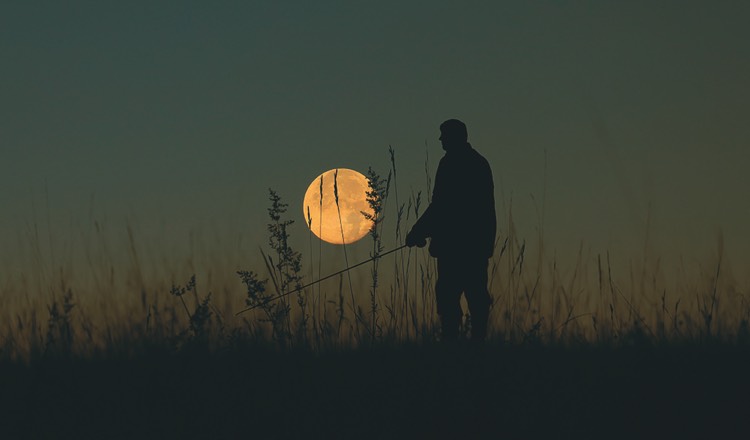Of the Harvest Moon
John Waller Hills

The Harvest Moon
From a Summer on the Test by John Waller Hills
Slowly, silently, now the moon
Walks the night in her silver shoon;
This way, and that, she peers, and sees
Silver fruit upon silver trees;
And moveless fish in the water gleam,
By silver reeds in a silver stream.
Silver by Walter De La Mare
I had always believed that chalk stream trout did not rise at night. You can catch them after dark, of course, and many of them; but this is merely the prolongation of the evening rise, not a night rise proper, which is a distinct event, starting later, above all starting after an interval, usually of one or two hours. I was quite certain that, the evening rise once ended, trout did not begin again, and that you did not get in Hampshire that second movement which takes place on some waters, where, in the opal dusk of a northern summer, you can fish from midnight till dawn. And of all evenings I should have considered one with a full moon the very worst. A full moon behind your arm was fatal as I had often proved, and even in front of you was bad. Trout are far more shy by moonlight than by sunlight. From this I concluded that there was no real moonlight rise on the Test. Thus I committed that facile mistake, generalising from knowledge which though true was incomplete. Moreover, you should not generalise about fishing, which admits not of generalisation. I was to learn something that evening of which I was ignorant before, for all my angling years.
As we walked to the river, the fisherman and I, in the chill September twilight, I asked the usual question about the prospect of sport. He answered that I should be lucky to catch anything at the ordinary evening rise, but that if I liked to stay out till ten o’clock, I was sure to do well. Then, after a pause, he added: It’s full moon tonight, harvest moon.
For a moment, the force of his words did not penetrate. It is such a commonplace among Hampshire fishermen that there is no night fishing, and that a full moon is much worse than a cloudless sun, that my brain refused to accept them. But, when I had recovered, the old fisherman quietly told me that once a year, at full moon of the harvest moon, trout would rise, though no other moon suited them equally well. I was silent, too astonished to enquire further.
As predicted, nothing happened during the first hour. One or two fish moved in that languid and spasmodic manner which they adopt when they do not intend to be caught. Then they stopped altogether, and I reeled up and waited for the moon. The sky cleared, it got colder and there was a light draught of air from the north. At last a glow in the east announced the rising of the moon, and she swung up over the dark wood, silvering all the world. We had been on the east bank, looking into such light as remained from where the sun had set; we now crossed over, so as to fish right into the moonlight. The river was broad, twenty to thirty yards, flowing at a sharp even pace, its surface luminous like quicksilver. I waited, still sceptical, but well content to watch the pure, cold beauty of the autumn night. But not for long did I wait. Suddenly a trout rose in midstream, and the waves of his rise, widening over the river and catching the moonlight as they moved, were made visible as by day, turning the surface into a mass of shivering spangles. I cast over him, hooked him, he plunged across the stream and got off. Another fish moved right under the far bank. It was a long cast even by daylight, and I was doubtful whether I could reach him, for a long throw requires accurate timing, and it is hard to judge rightly when you cannot see your line.
As we walked to the river, the fisherman and I, in the chill September twilight, I asked the usual question about the prospect of sport. He answered that I should be lucky to catch anything at the ordinary evening rise, but that if I liked to stay out till ten o’clock, I was sure to do well. Then, after a pause, he added: It’s full moon tonight, harvest moon.
For a moment, the force of his words did not penetrate. It is such a commonplace among Hampshire fishermen that there is no night fishing, and that a full moon is much worse than a cloudless sun, that my brain refused to accept them. But, when I had recovered, the old fisherman quietly told me that once a year, at full moon of the harvest moon, trout would rise, though no other moon suited them equally well. I was silent, too astonished to enquire further.
As predicted, nothing happened during the first hour. One or two fish moved in that languid and spasmodic manner which they adopt when they do not intend to be caught. Then they stopped altogether, and I reeled up and waited for the moon. The sky cleared, it got colder and there was a light draught of air from the north. At last a glow in the east announced the rising of the moon, and she swung up over the dark wood, silvering all the world. We had been on the east bank, looking into such light as remained from where the sun had set; we now crossed over, so as to fish right into the moonlight. The river was broad, twenty to thirty yards, flowing at a sharp even pace, its surface luminous like quicksilver. I waited, still sceptical, but well content to watch the pure, cold beauty of the autumn night. But not for long did I wait. Suddenly a trout rose in midstream, and the waves of his rise, widening over the river and catching the moonlight as they moved, were made visible as by day, turning the surface into a mass of shivering spangles. I cast over him, hooked him, he plunged across the stream and got off. Another fish moved right under the far bank. It was a long cast even by daylight, and I was doubtful whether I could reach him, for a long throw requires accurate timing, and it is hard to judge rightly when you cannot see your line.
But there was no difficulty. Throwing over twenty yards, I could yet plainly see my gut before it fell on the water, glistening like the scale of a herring, with iridescent drops streaming from it; aye, and I could see my fly too, floating gaily on the surface. It was no doubt a big one, a hackle sedge; but it was twenty-five yards off, and yet there it was, plain and obvious. For some time the trout went on rising, keeping the surface all in a quiver of pearly light but disregarding my fly, so I changed to a cinnamon sedge, a size bigger. This he had at once, with a mighty wallop, and was soon in the net. Trout never fight hard at night, and very rarely go to weed. He weighed 2lb exactly.
As the moon rose higher the night became clearer and colder. We walked slowly upstream. In a stretch shaded by heavy trees a trout splashed, and I peered into the wall of darkness to find him. At first, turning from the white moonlight into the dark obscurity of the trees, I could see nothing. But after a time the shadow became liquid, the darkness was made visible, and I could make out a faint movement on the black velvet of the water. I cast, but in the inky shadow it was impossible to see whether the fly went right. The wind, too, began to blow more strongly, straight downstream. At last the fish appeared to come at me, but only half-heartedly; he was not hooked, and stopped rising. We moved up higher still. Here the prospect widened, opening out into a broad stretch of level land, with the tiled roofs of the village and the slate steeple of the church on the one hand and a tall oblong mill on the other. The valley lay silent and still under the dominance of the moon, and river and reeds, meadows and distant woods were drenched in her clean and lucid light. So cold and hard was this light, so different was the atmosphere from the gracious warmth of a summer dusk, that a rise seemed unthinkable. Yet it was not so. Two or three trout were moving regularly, making ripples of silver phosphorescence. One of them, lying in midstream, took my sedge quietly and well, but, struck too soon, was missed, and flounced off with a splash. The next was almost touching the opposite bank, another long cast, and in a channel surrounded by weeds. After some failures - it was a narrow target - he was hooked, and hauled successfully over the weeds, protesting vigorously, into the clear water, but there he too came off.
By then it was past ten o’clock, our fingers were cold, and as the trout appeared to have retired to the bottom, we also went home to a fireside. I had only caught one, but I had had a chance of five. Above, all, I had gained an experience.
As the moon rose higher the night became clearer and colder. We walked slowly upstream. In a stretch shaded by heavy trees a trout splashed, and I peered into the wall of darkness to find him. At first, turning from the white moonlight into the dark obscurity of the trees, I could see nothing. But after a time the shadow became liquid, the darkness was made visible, and I could make out a faint movement on the black velvet of the water. I cast, but in the inky shadow it was impossible to see whether the fly went right. The wind, too, began to blow more strongly, straight downstream. At last the fish appeared to come at me, but only half-heartedly; he was not hooked, and stopped rising. We moved up higher still. Here the prospect widened, opening out into a broad stretch of level land, with the tiled roofs of the village and the slate steeple of the church on the one hand and a tall oblong mill on the other. The valley lay silent and still under the dominance of the moon, and river and reeds, meadows and distant woods were drenched in her clean and lucid light. So cold and hard was this light, so different was the atmosphere from the gracious warmth of a summer dusk, that a rise seemed unthinkable. Yet it was not so. Two or three trout were moving regularly, making ripples of silver phosphorescence. One of them, lying in midstream, took my sedge quietly and well, but, struck too soon, was missed, and flounced off with a splash. The next was almost touching the opposite bank, another long cast, and in a channel surrounded by weeds. After some failures - it was a narrow target - he was hooked, and hauled successfully over the weeds, protesting vigorously, into the clear water, but there he too came off.
By then it was past ten o’clock, our fingers were cold, and as the trout appeared to have retired to the bottom, we also went home to a fireside. I had only caught one, but I had had a chance of five. Above, all, I had gained an experience.
Read more from
A Summer on the Test

